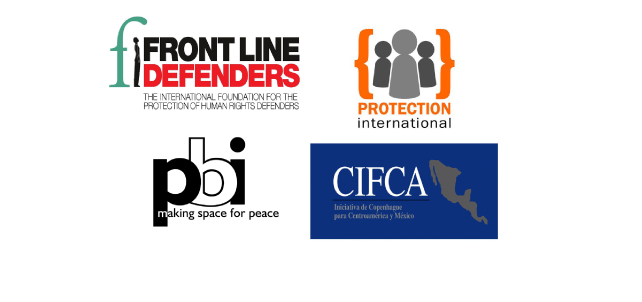Ahead of the EU-Mexico Human Rights Dialogue, which took place in Brussels on the 18th of March, Protection International together with PBI (Peace Brigades International), CIFCA (Iniciativa de Copenhague para Centroamérica y México) and Front Line Defenders submitted a joint briefing, reporting that HRDs in Mexico continue to suffer attacks, threats, harassment and murders. The four signatory organizations have identified deficiencies in the implementation of the National Protection Mechanism for Human Rights Defenders and Journalists and recommended some changes. At the end of the EU-Mexico Human Rights Dialogue, the Mexican government acknowledged the petitions submitted by the Civil Society Organisations – who will be closely monitoring the progress made by the government in delivering the promised changes.
Joint briefing on the situation of human rights defenders given EU-Mexico Human Rights Dialogue (summary)
1. New figures and facts on Human Rights Defenders (HRDs) in Mexico
In July 2013, the Office of the UN High Commissioner for Human Rights in Mexico (OHCHR-Mex) launched its third thematic report (Report on the situation of human rights defenders in Mexico: update 2012 and balance 2013) which denounces some of the human rights violations that Mexican organizations have been documenting in recent years: HRD in Mexico continue to suffer attacks, threats, harassment and murders1. The reports’ main findings can be summarized as follows:
- Violence against HRD continues to escalate
- New trends in aggression mean more risks.
- Impunity remains extremely high
- Attacks by State actors continue to be carried out
- Defenders most suffering attacks are journalists, migrants’ rights defenders, land rights defenders, environmental defenders, and those fighting against impunity or denouncing drug trafficking. Women in HRD are also especially at risk.
- Oaxaca, Guerrero, Chihuahua and Coahuila are identified as the most unsafe for HRD. Chiapas and Mexico City are also among the states where the majority of attacks are reported.
2. The National Protection Mechanism for Human Rights Defenders and Journalists
In light of this situation, the National Protection Mechanism for Human Rights Defenders and Journalists (enacted in 2012) generated high expectations about the willingness of the Mexican Government to properly fulfil its responsibility in protecting HRDs and journalists at risk.
The conjunction of several components created the first opportunity to ensure proper protection for HRD and journalists at risk. FLD, PBI, PI and CIFCA recognise that important efforts have been made in 2013 by the national authorities to put in place the NPM.
However, given the deficiencies detected in 2013 regarding the effective implementation of security measures, CSOs alerted the authorities and requested several changes. To date, several challenges remain in the operation of the NPM to fully become an effective institutional answer to the risk faced by HRD and journalists in Mexico. In addition, several deficiencies have not yet been addressed and should be improved for the Mechanism to be properly implemented:
- A significant backlog of cases. To date, the NPM has received approximately 130 requests for protection, but only 37 cases have been reviewed by the Governing Board.
- Despite the creation of a Technical Committee of the Trust Fund, accessing the budget allocated since 2013 had not been possible for bureaucratic reasons.
- The Unit of Prevention, Analysis, and Monitoring charged with monitoring the trends and patterns of the attacks perpetrated to promote structural preventive measures and evaluate the implementation of the security plans has not been yet set up.
- Risk Analysis is weak and protection measures are mainly focused on a police-oriented approach. In some of the cases, the measures given do not correspond to the level and nature of risk of the HRD.
- Fight against impunity should be at the core of the implementation of the mechanism. The NPM is still far from becoming a tool to combat impunity.
- Alarming lack of understanding regarding the protection of HRD and journalists among the staff of the NPM.
Despite the voluntary cooperation agreements signed between the federal state and most of the State governors, coordination among the different levels of government still faces challenges.
In conclusion, the current situation may be coming to a critical stage before the NPM loses CSO support. Despite the ongoing external technical support from Freedom House, there is no plan at the NPM for institutional building, nor a binding agreement to make the adjustments needed stemming from such technical support for long-standing results.
3. Cases raised by Front Line Defenders and Peace Brigades International in 2013-2014
- Human Rights Defenders from the Tehuantepec Isthmus, Oaxaca
- Threats against Ms Alba Cruz – Committee for the Defence of Human Rights Gobixha – Código-DH
- Break-in at the offices of Centro de Derechos Humanos Juan Gerardi (Juan Gerardi Human Rights Centre)
- Aggressions against migrants’ defenders
- Arrest and detention of Mr Nataniel Hernández Núñez – Director Centro de Derechos Humanos Digna Ochoa (Digna Ochoa Human Rights Centre)
Related information (Mexican government official statement):
Mexico and the European Union conclude a bilateral dialogue on human rights


